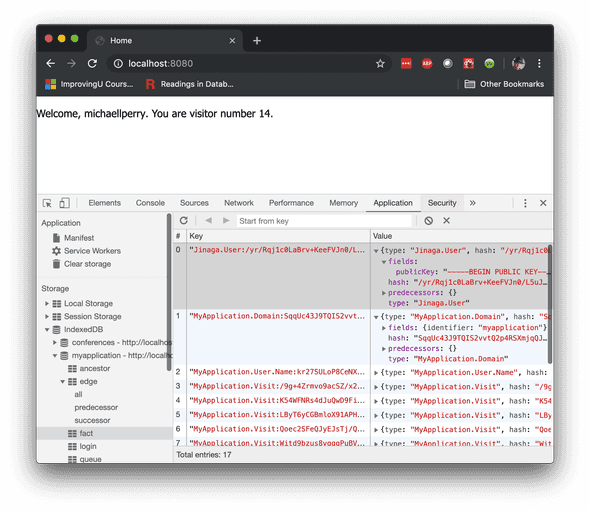Explore
Open up the Application tab again, but this time let's look at the IndexedDB section. In there, you will find a collection called myapplication, which contains several tables. Click on the table called facts.
Within this collection, you will see one fact that is the Jinaga.User.
It represents your identity, since you are the person who logged in using Twitter.
Expand this fact, and you will see it has fields.
More precisely, it has one field, the publicKey.
Jinaga randomly assigned this public key to you when you logged in using Twitter.
Next look at the fact of type MyApplication.User.Name.
You will see that it has a single field -- called value -- which holds a string that you might recognize.
As exciting as this is, the even more exciting part is that the name pas predecessors.
One of these predecessors is called user, and if you compare the hash carefully you will see that it points back to the previous fact.
Creating Facts
What you see here is the storage format for a fact.
In code, they actually appear in a more direct and useful form.
You can see how one of these is created in src/shared/model/user.js.
Pay special attention to the UserName constructor.
This constructs a JavaScript object having a type, user, value, and prior field.
The constructor is called in src/client/components/user-container.jsx.
You can flip back and forth between this constructor and its call site to see how this object is created.
The type will always be 'MyApplication.User.Name', as given by the constant.
The user will be the user fact.
The value field is the user handle that comes back from Twitter when they log in.
And the prior field is an array.
The JavaScript object will end up looking something like this:
{
type: "MyApplication.User.Name",
user: {
type: "Jinaga.User",
publicKey: `-----BEGIN PUBLIC KEY-----\r\n
MIIBIjANBgkqhkiG9w0BAQEFAAOCAQ8AMIIBCgKCAQEAvfIehuJcr+8poagQgTSQ\r\n
LKBkJH11Dzfm8mmF/G9SSrJDY5cfsmJSTuGsqWhawcy0lOu0cYPn0zhc6L1GrJA/\r\n
g9rlkIIOWqYXVxj6nmaufSKC+ub1qSU8bEFEAO3O9Fpki+UWM16b+f1X3DfV4qbv\r\n
Ru21HxvWju/zQk0pIcj5v2Oz7U/ze8zBlfVttWFhCsygKuRjXXT9fUDDzlObh1GF\r\n
nMiMXqAYrUKXvIycgu2ccqDihuQX3FSrnzZZpL2z+zjnPYchlGAjLF1FjdqE4EFs\r\n
rtiQPTf5tvNY74PTtdgMpziRgoNCIYPUvpri6JYmSxWsqxeWrlLZaTe9enVcxFBd\r\n
3wIDAQAB\r\n
-----END PUBLIC KEY-----\r\n`
},
value: "michaellperry",
prior: []
}This JavaScript object is a fact. Facts are explained briefly on the home page, and in a bit more detail in the docs, so I won't rehash that here. The important thing is that they are saved in the browser.
